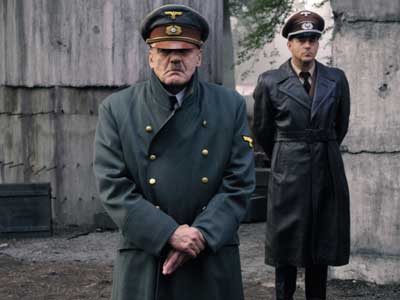Recomended movie: “Downfall”
The triumph of chaos
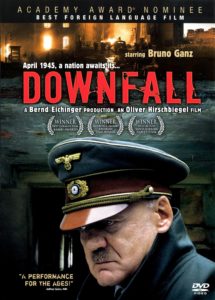 What is most fascinating about cinema is the possibility of revisiting a theme, which has already been much explored, and still being able to be shown from a new perspective. More than five hundred films about World War II have already been made, but the German production “Downfall” (“Der Untergang”, ALE, 2004) still manages to surprise. At a time when Hitler candidates abound, it is always good to remember how sick was the original one.
What is most fascinating about cinema is the possibility of revisiting a theme, which has already been much explored, and still being able to be shown from a new perspective. More than five hundred films about World War II have already been made, but the German production “Downfall” (“Der Untergang”, ALE, 2004) still manages to surprise. At a time when Hitler candidates abound, it is always good to remember how sick was the original one.
Despite being a fictional work, and having been researched from various sources, the film relies heavily on the testimony of Gertraud Traudl Junge, at the time, a young woman of 24, who, as Hitler’s personal secretary, was present in the center of the power in the final moments of the war and the life of the German leader.
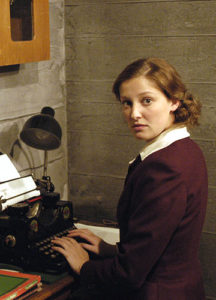 The film begins in 1942, when Gertraud, along with other young women, takes the test for the position of secretary and meets Hitler. For them, he was the most important man in the world. Very nervous, she can barely type what he says, but ends up getting the job. Despite the family’s resistance, she is happy with what appears to be Germany’s best job.
The film begins in 1942, when Gertraud, along with other young women, takes the test for the position of secretary and meets Hitler. For them, he was the most important man in the world. Very nervous, she can barely type what he says, but ends up getting the job. Despite the family’s resistance, she is happy with what appears to be Germany’s best job.
After this very brief prologue, the story progresses to April 1945, when the panorama is already totally different. After six years of struggle with the rest of the world, Germany is completely besieged within its borders, with Russian occupation on one side, and the Allies on the other. On April 20, Hitler’s birthday, Russian troops closed the siege on the capital, Berlin, with crushing attacks.
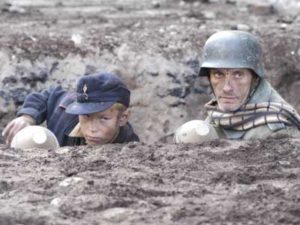 The situation is one of total confusion and despair. On the streets, ten-year-old children and old octogenarians are forcibly recruited to fight invaders. Whoever refuses or flees the post is hunted as a deserter or collaborator, and the only punishment is summary execution. There is no food, water or energy for the civilian population, who are trapped, not knowing where to go. Improvised soldiers kill more Germans than enemy soldiers.
The situation is one of total confusion and despair. On the streets, ten-year-old children and old octogenarians are forcibly recruited to fight invaders. Whoever refuses or flees the post is hunted as a deserter or collaborator, and the only punishment is summary execution. There is no food, water or energy for the civilian population, who are trapped, not knowing where to go. Improvised soldiers kill more Germans than enemy soldiers.
In the bunker, Hitler’s Chancellery underground shelter, where all actions are commanded, the confusion is no less. While listening to the impact of bombs and enemy artillery, Hitler, amid the spasms of Parkinson’s disease and delusions of grandeur, utters orders and blasphemies against the generals, accusing them of incompetence, demanding movements of imaginary troops, and promising impossible victories.
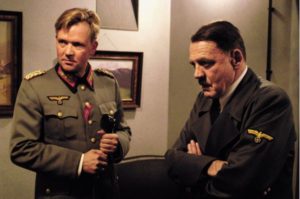 Some of the generals, more aware of the reality, try to warn against the risks to the civilian population, but Hitler and Goebbels, the powerful Chancellor and Minister of Propaganda, besides not giving importance to this, consider that if Nazism ends, the German people must die with it. It is as if the people, and not him, Hitler, had decided to go to war against the rest of the world …
Some of the generals, more aware of the reality, try to warn against the risks to the civilian population, but Hitler and Goebbels, the powerful Chancellor and Minister of Propaganda, besides not giving importance to this, consider that if Nazism ends, the German people must die with it. It is as if the people, and not him, Hitler, had decided to go to war against the rest of the world …
Amid nervous news about the war, the bunker, known as Wolf’s Den, lives its moments of frivolity. Sumptuous dinners, parties and a lot of drinking continue to happen, while the city is destroyed by bombs, and the wounded pile up in hospitals.
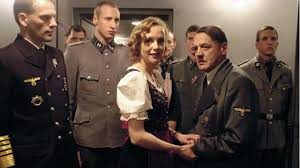 Everything is seen through the innocent eyes of Traudl , who, like most of the German people, grew up plunged into Nazi propaganda, and had no idea about the atrocities committed in the concentration camps against Jews, communists, homosexuals, gypsies and other minorities.
Everything is seen through the innocent eyes of Traudl , who, like most of the German people, grew up plunged into Nazi propaganda, and had no idea about the atrocities committed in the concentration camps against Jews, communists, homosexuals, gypsies and other minorities.
As the last days of April drag on, more deaths and destruction happen, mainly due to Hitler’s refusal to admit defeat. In his view, the only way out was death. On April 29, he marries his partner Eva Brown, and the next day, when the Russians invade the city, the two committed suicide. In obedience to his orders, the two bodies were soaked with gasoline, burned and buried in the gardens of the Nazi headquarters.
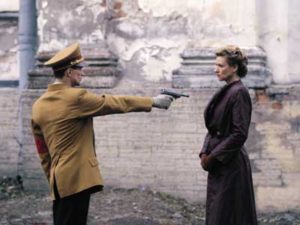 Faithful followers until the end, Goebbels and his wife imitate his leader, but not before killing their own children, “so they do not grow up in a world without Nazism”, according to his words. This scene, incidentally, is one of the most impressive in the movie.
Faithful followers until the end, Goebbels and his wife imitate his leader, but not before killing their own children, “so they do not grow up in a world without Nazism”, according to his words. This scene, incidentally, is one of the most impressive in the movie.
Many people criticized the film for “humanizing” Hitler, since it shows the dictator with the symptoms of Parkinson’s disease, exchanging pleasantries with people, etc.. But, the movie does not fail to show the outbreaks of rage, and his absurd values, that made him one of the greatest scourges of Humanity.
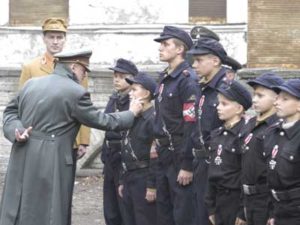 Every tyrant or benefactor is still a man, what makes him different is the situation that leads him to power, and what he does with it. In the case of Hitler, the shattered post-World War I Germany was the ideal mass to build up Nazism, and implement their ideas of expansionism and racial purge.
Every tyrant or benefactor is still a man, what makes him different is the situation that leads him to power, and what he does with it. In the case of Hitler, the shattered post-World War I Germany was the ideal mass to build up Nazism, and implement their ideas of expansionism and racial purge.
If there is a sin in the movie, it is not to contextualize what happens there, the war itself, the historical moment. This is not a film for non-insiders in World War II history. The main names of Nazism, Himmler, Goebbels, Goering, Speer, parade throughout the film, without any presentation about them. The author assumes that the viewer knows them.
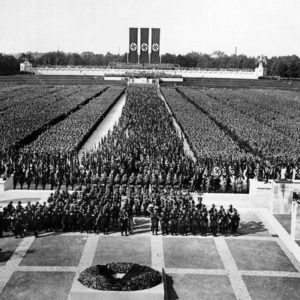 But what is most powerful in the movie is the presentation of the dirty face of the war in a raw way, without the Hollywood heroism, under the perspective of those in the crossfire, impotent to their fate, which is decided by people with totally corrupted minds.
But what is most powerful in the movie is the presentation of the dirty face of the war in a raw way, without the Hollywood heroism, under the perspective of those in the crossfire, impotent to their fate, which is decided by people with totally corrupted minds.
Young Gertraud, like most of the German people, was unaware of what was done in the Jewish death camps. She was brought up under very strong state propaganda, which deified Hitler and preached the superiority of the Aryan race. To get a good idea how was that propaganda, I suggest the film “Triumph of the Will” (“Triumph des Willens”, ALE, 1935), where the Nazi German Party Congress of 1934 is documented impressively by filmmaker Leni Riefenstahl. Despite being considered infamous by many, this movie is an important historical document, and is still available in physical media and online .
 As for the edition of “Downfall”, on DVD and Blu-Ray, it is to regret the poverty of the edition. The film was kept with its full 152-minute cut, the audio is available in German, French and Portuguese DTS-HD MA 5.1, and subtitles disponibles in English and Portuguese. Extras, unfortunately, none. Could have been added, for example, the documentary “I Was Hitler’s Secretary” (“Im Toten Winkel – Hitlers Sekretärin”,ALE,2002), where Traudl Junge herself narrates her experiences alongside the dictator.
As for the edition of “Downfall”, on DVD and Blu-Ray, it is to regret the poverty of the edition. The film was kept with its full 152-minute cut, the audio is available in German, French and Portuguese DTS-HD MA 5.1, and subtitles disponibles in English and Portuguese. Extras, unfortunately, none. Could have been added, for example, the documentary “I Was Hitler’s Secretary” (“Im Toten Winkel – Hitlers Sekretärin”,ALE,2002), where Traudl Junge herself narrates her experiences alongside the dictator.
“Downfall” was Germany’s representative to compete for the Best International Feature Film category at the 2005 Oscar. The movie won 22 awards and 33 nominations at film festivals around the world. Despite the negative points cited, this is a very interesting film, by its historical point of view, to prove, once again, the futility and stupidity of war, and would-be mythical leaders. Check it out and form your own opinion.

